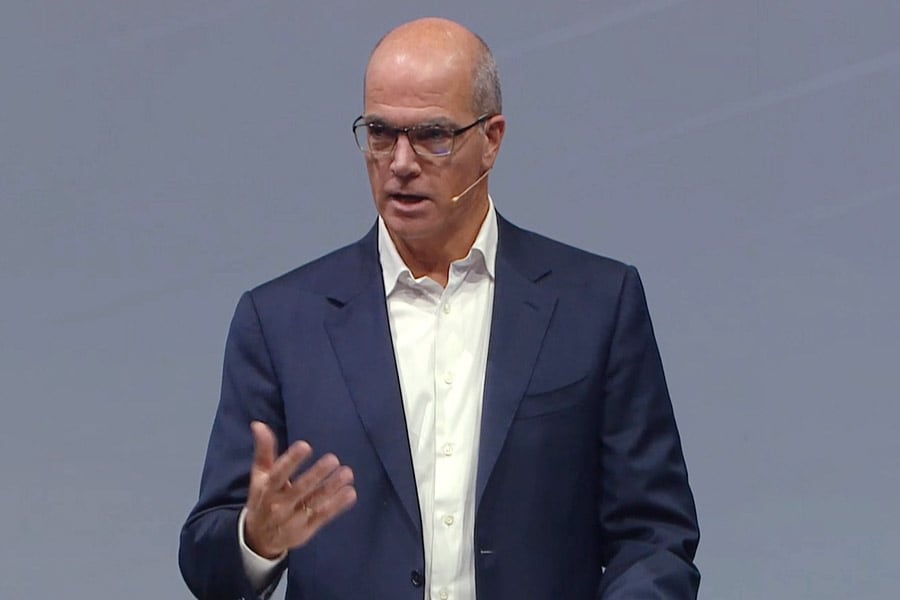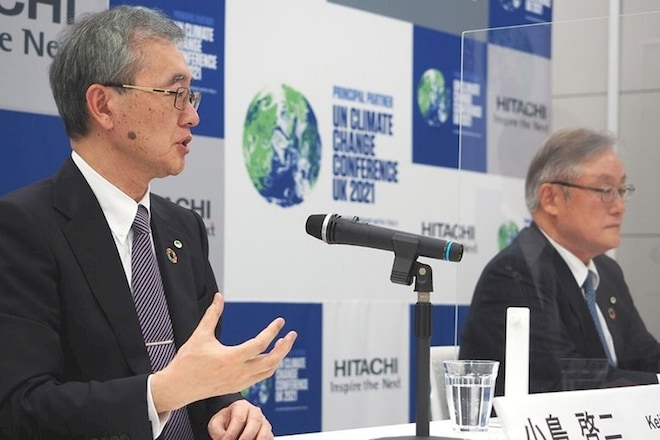Designing Trains That Blend Seamlessly into Daily Life
Hitachi Announces Environmental Strategy for Carbon Neutrality Investment of 84 Billion Yen over 10 Years
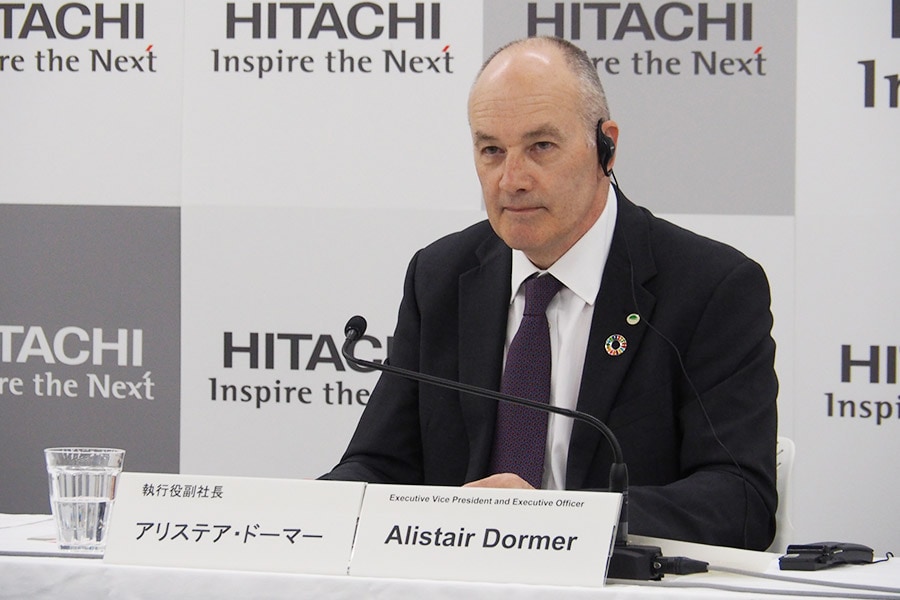
Companies worldwide are facing demand to take measures against climate change. Recently, this has even reached the selection process for business and investment partners, as the commitment to reducing CO2 emissions becomes an important selection index.
Against this backdrop, Hitachi, Ltd. held a briefing session on February 25, 2021 to announce specific strategies for “Hitachi Carbon Neutrality 2030”, which is an initiative aimed at net-zero CO2 emissions by fiscal year 2030. With its mission to create environmental value, Hitachi will work to achieve a carbon-neutral society through both its own economic activities and by providing solutions that reduce environmental impact.
"This change is the next great opportunity for us"
At the opening of the conference, held at Hitachi’s Marunouchi headquarters in Tokyo, Alistair Dormer (Executive Vice President and Executive Officer of Hitachi, Ltd.) spoke as follows:
"The last 12 months has been a very difficult time for many of us with the pandemic. However, one real positive to come of this, is that governments around the world have committed to carbon neutrality. I see this change as the next great opportunity for Hitachi.”
Hitachi has a history of efforts to reduce CO2 emissions. The company invested 50 billion yen in energy-saving measures over the 10-year period from fiscal year 2011 to 2020. By introducing new equipment and optimizing operating conditions, Hitachi achieved a 17% reduction in CO2 emissions from 5.28 million tons in 2010 to 4.37 million tons in 2019.
In 2020, three sites achieved carbon neutrality: Hitachi High-Tech Kyushu Corporation, Hitachi High-Tech Fine Systems Corporation, and Hitachi High-Tech Science Corporation.
Executive pay linked to environmental performance
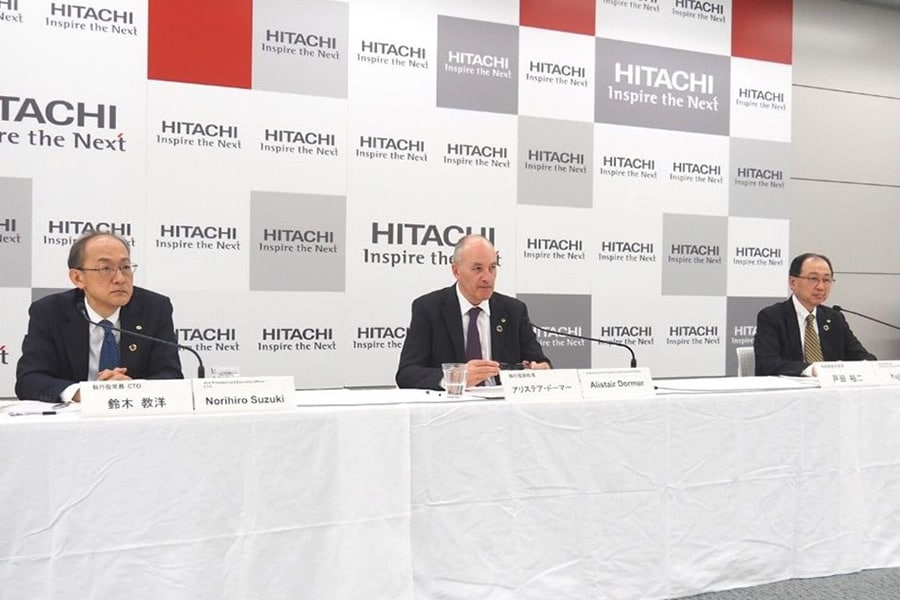
Hitachi Carbon Neutrality 2030, which sets out a plan through to 2030, prescribes a total investment of 84 billion yen. 60 billion yen of that will be invested in energy-saving, with the remaining 24 billion yen going to renewable energy. These outlays will contribute to Hitachi's goal of reducing its electricity consumption and CO2 emissions by a minimum of 22% and 24%, respectively. Hitachi intends to speed up carbon neutrality not only through its own economic activities but also by providing solutions that reduce environmental impact.
Regarding the company's economic activities, Hitachi will work to update and improve its facilities toward minimizing energy consumption. It has established a goal of net-zero for CO2 emissions generated in raw materials and parts procurement, in factory production processes, and in office use of electricity by fiscal year 2030, all by pursuing such strategies as pool purchasing of renewable energy by region to minimize cost.
Further measures for promoting CO2 reduction will include a new system scheduled to start in fiscal year 2021 that links environmental performance to executive pay. Hitachi has also set on shooting for an 80% reduction in current CO2 emissions by 2050 through such measures as requesting raw materials and parts suppliers to create CO2 reduction plans.
Promoting the electrification of railways and buses on a global scale
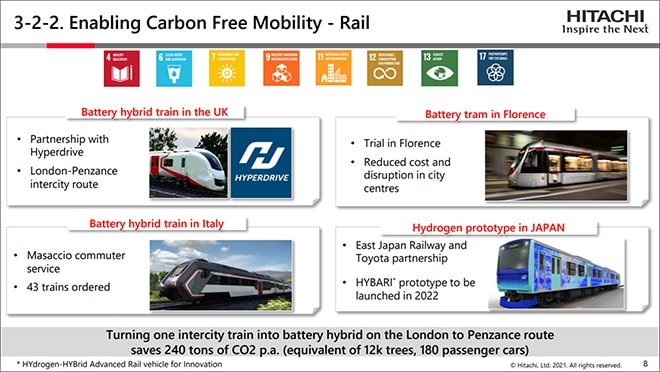
In other areas, three sectors will be targeted for environmental impact reduction solutions. These are (1) energy, (2) transportation, and (3) industry (manufacturing).
In the energy sector, Hitachi has developed a system that employs smart meters and blockchain technology to enable the visualization of renewable energy use on a smartphone. To be released in April 2021, the system is expected to help raise environmental awareness among companies and increase momentum in the active use of renewable energy.
In addition, as the use of renewable energy increases, there will be greater impact from weather and other external factors, making it important to control the supply-demand balance. For example, the Energy Management System (EMS) by Hitachi ABB Power Grids analyzes real-time forecasts and historical data, making it possible to improve the operational efficiency of renewable energy and to provide a stable supply of electricity. Hitachi will encourage renewable energy usage by implementing this system at offices and factories.
In the transportation sector, 20% of the world's CO2 emissions are related to transit, fueling expectations for big reductions in CO2 via the effective use of buses and railways for their ability to carry large numbers of people at one time. In support of this, Hitachi Astemo, which was launched on January 1 of this year, will provide electric vehicle (EV) charging infrastructure for bus and commercial vehicle operators and software for optimizing the state of a vehicle's batteries, while working toward realizing an EV society.
Dormer stated that, "For Hitachi, this EV sector is a fantastic harvest of data. With our experience in renewable energy management and battery energy storage projects, we have a real advantage in this sector.”
In the railway sector, battery-hybrid trains have begun commercial operation and operational testing in the U.K. and Italy. In the U.K., Hitachi’s single battery-hybrid train operating commercially is contributing to a reduction of 240 tons worth of CO2 emissions per year. In Japan, Hitachi is collaborating with the East Japan Railway Company and Toyota Motor Corporation to set forth plans to start test operations for a fuel-cell hybrid railway in 2022.
Engagement between companies: On the rise in the industrial sector
After pointing out that industry-sector manufacturing accounts for 54% of the world's energy consumption and 20% of its emissions, Dormer brought his presentation to a close with the following comments:
"In the Industry sector, we are working with customers to help them address their challenge to reduce CO2. Green technology x Digital is a real engine for growth for Hitachi. This is a really exciting time for us to help cities, governments, and companies to cut carbon and accelerate our potential as a climate change innovator."

